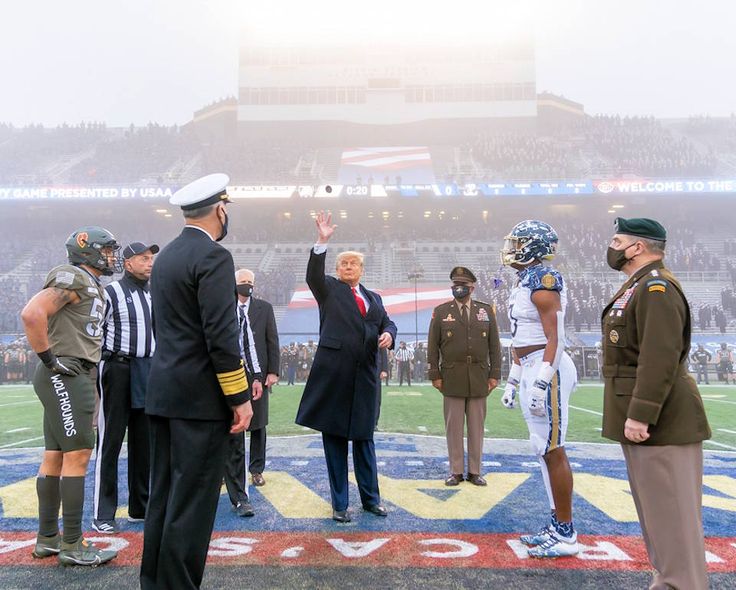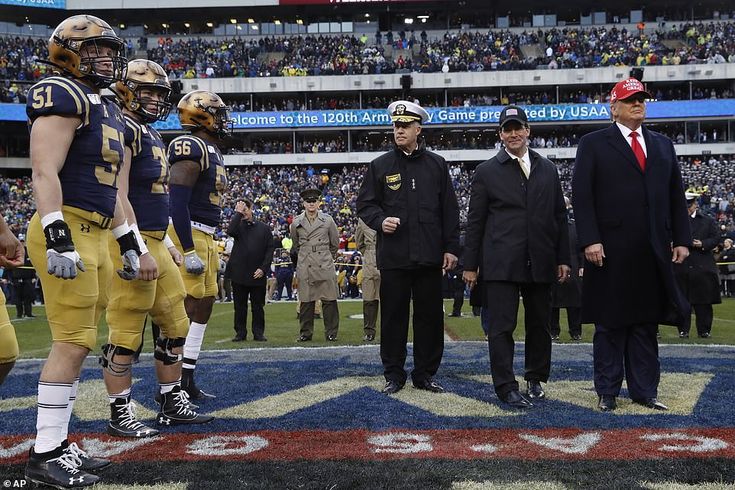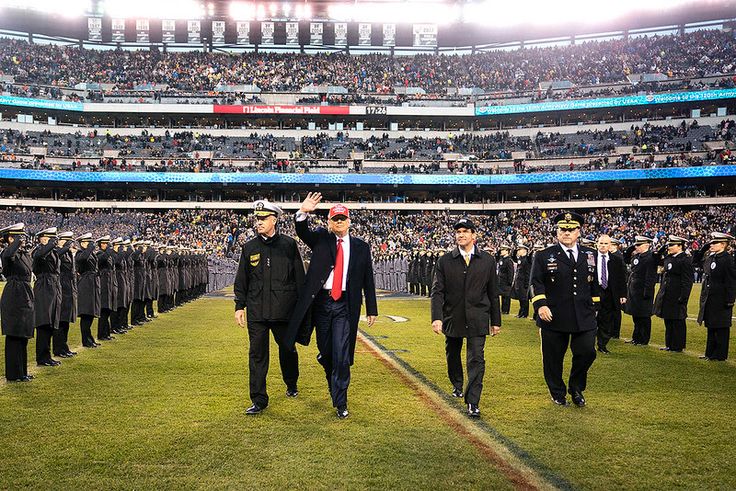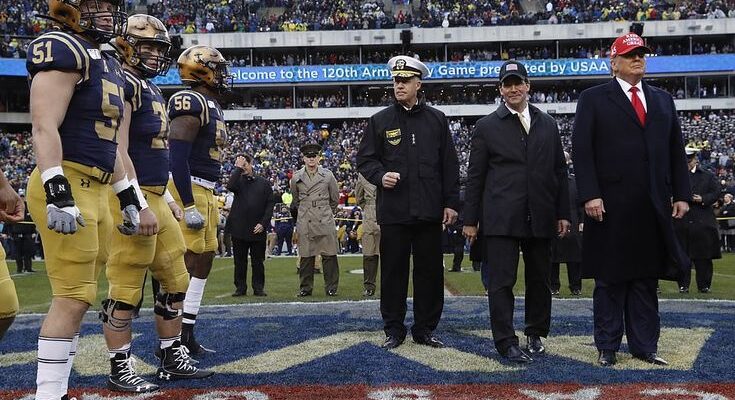In a surprising turn of events, President-elect Donald Trump, along with Ohio Senate candidate J.D.

Vance, attended the annual Army-Navy football game in December 2024, signaling a moment of unity between political power and American tradition. This highly anticipated matchup between two of the nation’s most storied military academies was already a must-see event for sports fans, but Trump’s attendance added a unique political dimension to the proceedings, blending the worlds of sports and politics in a way that resonated far beyond the football field.
The Army-Navy game, held every year to determine which service academy reigns supreme in collegiate football, is a longstanding tradition in American sports. The rivalry is steeped in history, symbolizing not only competition but also camaraderie between two elite institutions that train the future leaders of the U.S. military. The game, known for its pageantry, spirit, and patriotism, is watched by millions of fans and often includes prominent political figures who come to pay homage to the men and women in uniform. Trump’s attendance, coupled with his presence alongside Vance, added layers of political intrigue to the day’s festivities, offering a moment to analyze both the intersection of sports and politics and the evolving landscape of American conservatism.
The Significance of the Army-Navy Game
The Army-Navy game is much more than just a football game. It’s a defining event in American sports culture. The contest between the U.S. Military Academy (Army) and the U.S. Naval Academy (Navy) is held annually at a neutral site, rotating between locations like Philadelphia and Baltimore, and brings together some of the best and brightest athletes from the U.S. military. It’s a day to honor military service, celebrate the values of discipline, honor, and sacrifice, and pay tribute to the cadets and midshipmen who will one day lead America’s armed forces.
In addition to the military significance, the Army-Navy game is also a cherished tradition among politicians. Presidents, vice presidents, and members of Congress have attended the game for decades, using the occasion as a symbol of respect for the armed forces. For Trump, the decision to attend the game was in keeping with his longstanding political identity, which has consistently emphasized support for the military and veterans.
For the country’s political elite, attending the Army-Navy game provides an opportunity to reinforce their patriotism and connection to the military, while also signaling their support for the troops. This year’s game was no different. As President-elect, Trump’s appearance at the event marked a significant moment in his transition from the campaign trail to the role of Commander-in-Chief. But the decision to bring J.D. Vance along, a key political ally, added an additional layer of political calculation to the day’s events.
J.D. Vance’s Role and Political Trajectory
J.D. Vance, a venture capitalist and author of the bestselling memoir Hillbilly Elegy, rose to prominence as an outspoken advocate for the working-class struggles in Appalachia. Vance became a central figure in the Republican Party’s shift toward populism, aligning himself with Trump’s brand of conservative nationalism. Vance’s political journey reached a significant milestone in 2022 when he was elected to the U.S. Senate from Ohio, after securing the Republican nomination in a race marked by Trump’s strong endorsement.

Vance’s political philosophy is shaped by his experiences growing up in poverty and his belief in the decline of traditional American values, especially in industrial regions that have struggled economically in recent decades. His candidacy was seen as an extension of Trump’s appeal to working-class voters, especially those in the Rust Belt who felt alienated by the political establishment. Vance’s embrace of Trump’s populist agenda, with a focus on economic nationalism, cultural conservatism, and skepticism of globalism, made him a natural ally for the former president.
For Vance, attending the Army-Navy game with Trump represented an opportunity to solidify his political identity as a rising star in the populist wing of the Republican Party. Vance’s political style, often described as combative and unapologetically conservative, resonates with voters who feel left behind by both parties and are drawn to leaders who promise to challenge the status quo. Vance’s presence at the game with Trump underscored his deep ties to the former president and the broader conservative movement.
The pairing of Trump and Vance at such a symbolic event was not just about showing support for the military; it was a strategic move designed to bolster Vance’s national profile. In the context of Ohio’s pivotal role in presidential elections, Vance’s political fortunes are closely tied to Trump’s influence, and aligning himself with Trump at such a high-profile event was a way for him to continue solidifying his standing within the Republican Party as a leading figure of its populist faction.
Trump and the Military: A Complex Relationship
Trump’s relationship with the U.S. military has been a subject of significant attention during his political career. Throughout his presidency, Trump made strong statements in support of the military, promising to rebuild the armed forces, provide better resources for veterans, and strengthen America’s global position. He also frequently showcased his own role as Commander-in-Chief, attending military events and honoring veterans.
However, Trump’s relationship with the military was also marked by controversy, particularly with some top brass who disagreed with his policies and leadership style. His handling of the military during protests and social justice movements, as well as his decision to reduce the number of U.S. troops stationed overseas, generated significant debate. Still, for many of his supporters, his staunch advocacy for the military and veterans earned him admiration.
The Army-Navy game presented a unique opportunity for Trump to reassert his connection to the military in a more symbolic and unifying way. By attending the game with Vance, Trump reinforced his image as a leader who values military service and who is in touch with the concerns of ordinary Americans. His appearance also allowed him to appeal to the military community, which traditionally has leaned more conservative, while further cementing his ties to key Republican figures like Vance.
The Political Symbolism of the Moment
Trump’s attendance at the Army-Navy game alongside Vance was more than just a sporting event—it was a political statement. The game itself symbolizes American patriotism, unity, and respect for the armed forces, but with Trump and Vance in attendance, it also became a moment to showcase the enduring influence of Trump’s political ideology. Their presence served as a reminder that Trump’s brand of populism continues to dominate the Republican Party, and that figures like Vance are seen as the future of conservative politics.

For Vance, being seen with Trump at such a high-profile, patriotic event was an opportunity to demonstrate that his political trajectory is closely aligned with the former president’s vision. By standing alongside Trump, Vance signaled his commitment to the America First agenda, which has shaped much of the GOP’s direction since Trump’s rise to power in 2016.
For Trump, attending the Army-Navy game was a symbolic gesture of his continued prominence in American political life. Despite facing political challenges in the aftermath of his presidency, Trump remains a central figure in the Republican Party and a dominant force in shaping the party’s future. His appearance at the game underscored his continued relevance and his ability to command attention, even as the political landscape shifts around him.
Conclusion: Politics, Sports, and American Identity
The sight of President-elect Donald Trump attending the Army-Navy football game with J.D. Vance was more than just a moment of political theater. It was a powerful reminder of how deeply intertwined politics and sports have become in contemporary American life. The game, with its emphasis on military service and national pride, provided a fitting backdrop for Trump to showcase his support for the military and his continued influence over the Republican Party. For Vance, the event served as a platform to solidify his political alignment with Trump and to further define his place in the growing populist movement.
Ultimately, the Army-Navy game was a microcosm of the larger political and cultural battles unfolding in America. With Trump’s influence still pervasive, and figures like Vance positioned to carry his mantle forward, the intersection of politics, sports, and identity will continue to shape the future of American public life.



